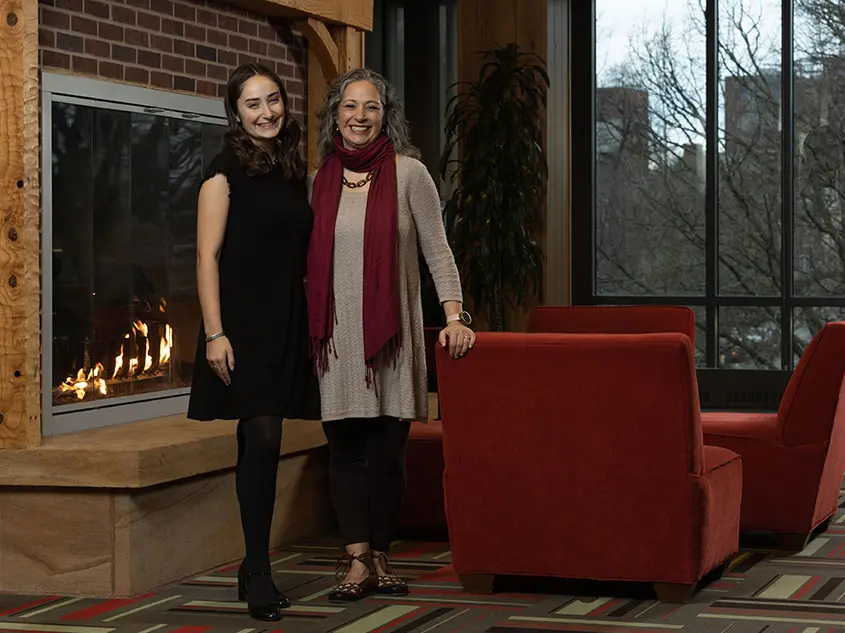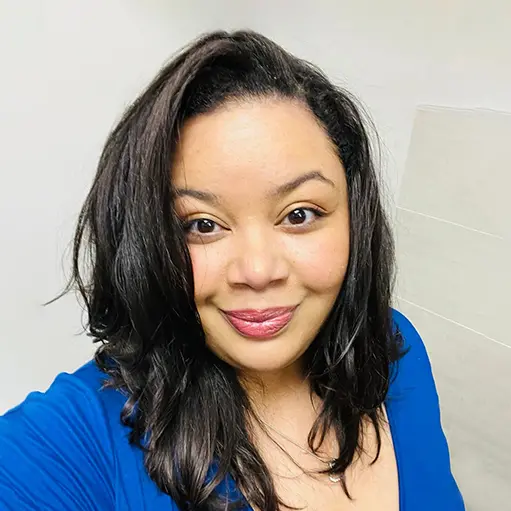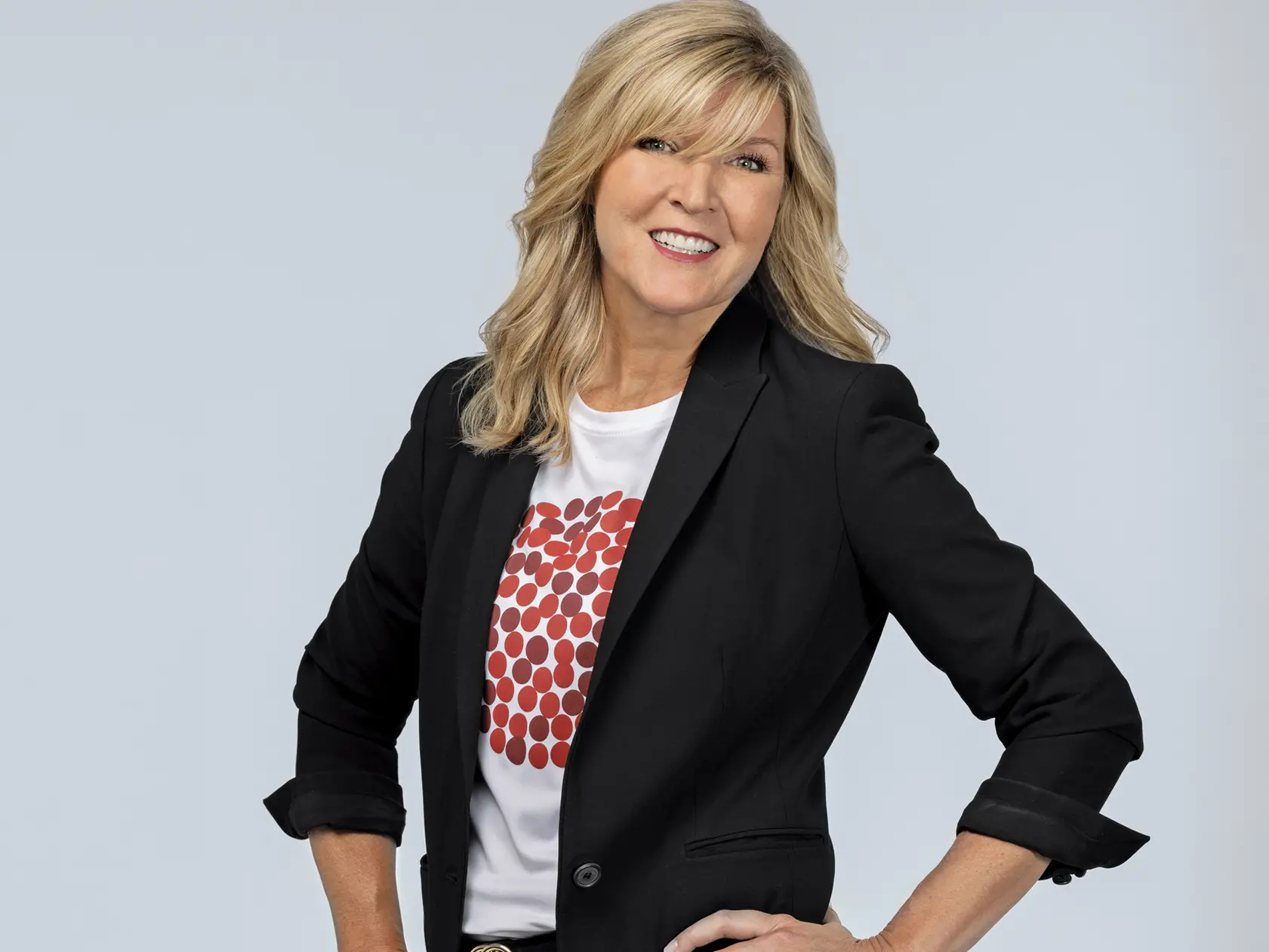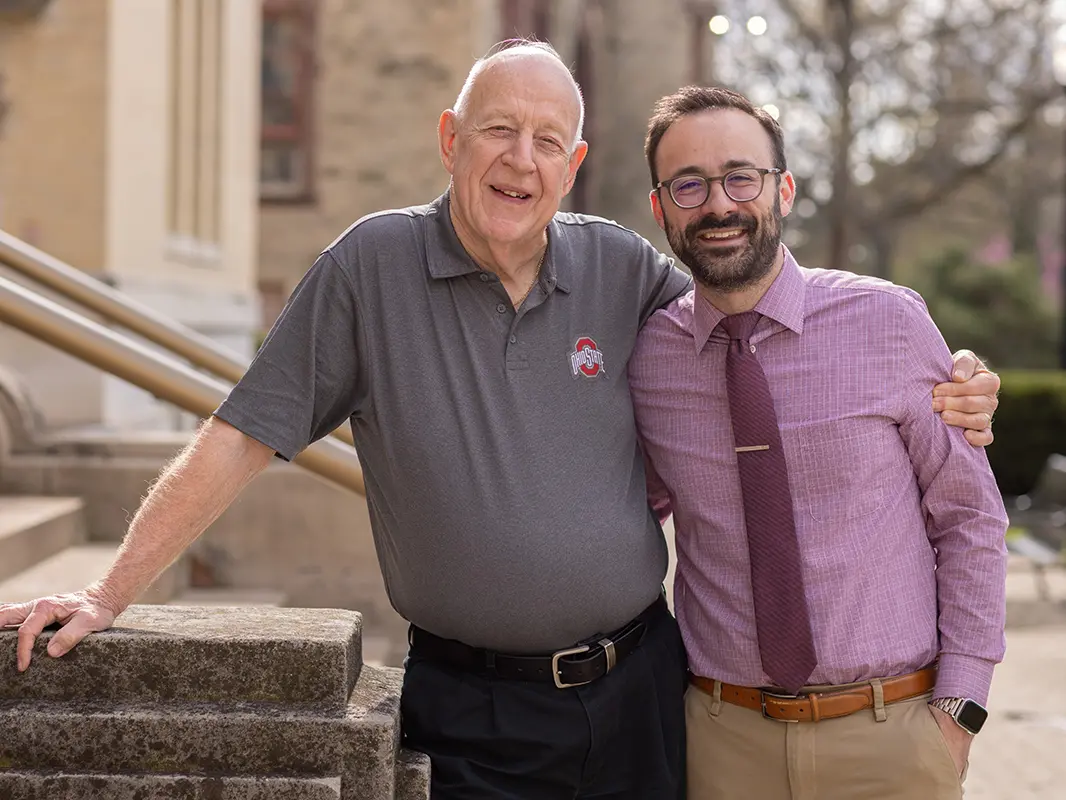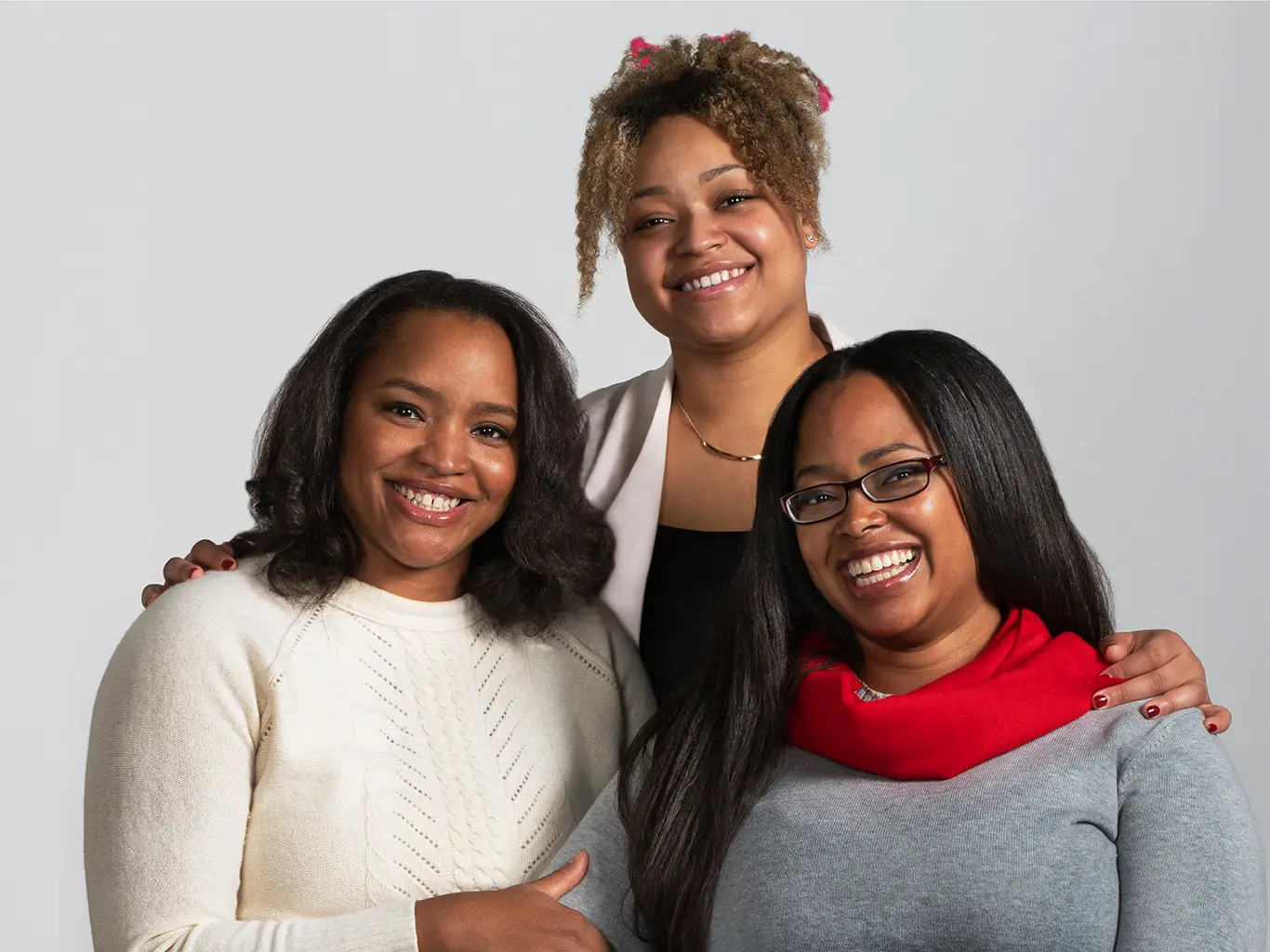A love for learning, leading is in this family’s genes
A family elder who worked as a university custodian passed down her passion for service to Tina Pierce and her son Andrew, who found opportunities to serve in Undergraduate Student Government.
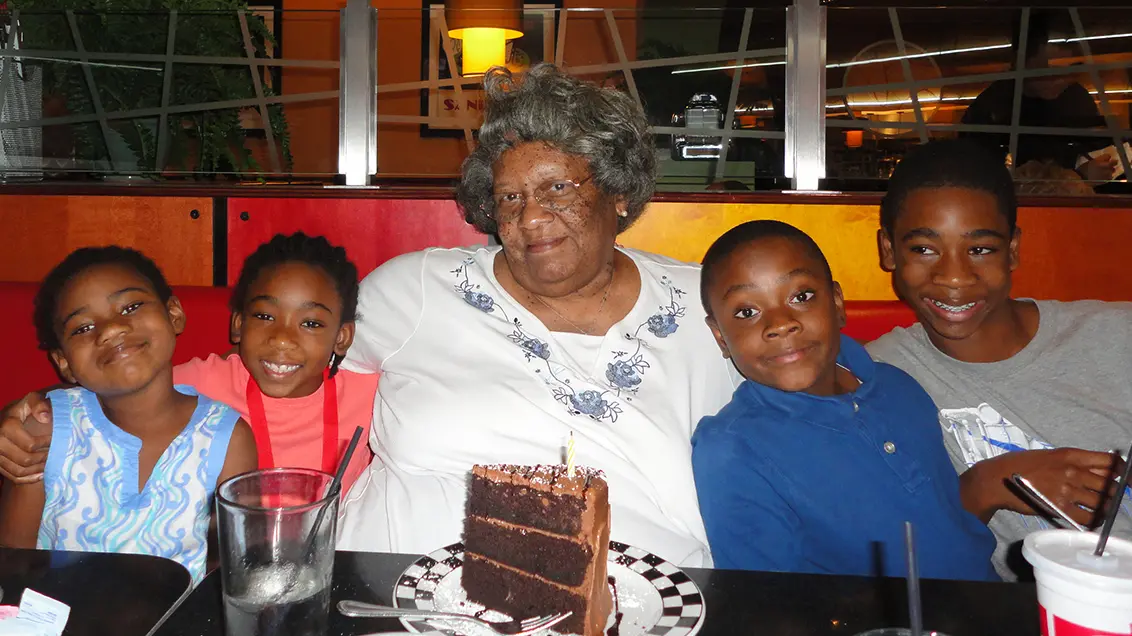
In this family photograph, Gracie Diggs celebrates with great-grandkids (from left) Michelle, Catherine and current Ohio State students Malcolm and Andrew Pierce. Diggs helped instill in her family the importance of service and higher education. (Photo courtesy of Tina Pierce)
Many of us have a quiet hero in our lives — someone who is highly influential in the decisions we make and the paths we follow.
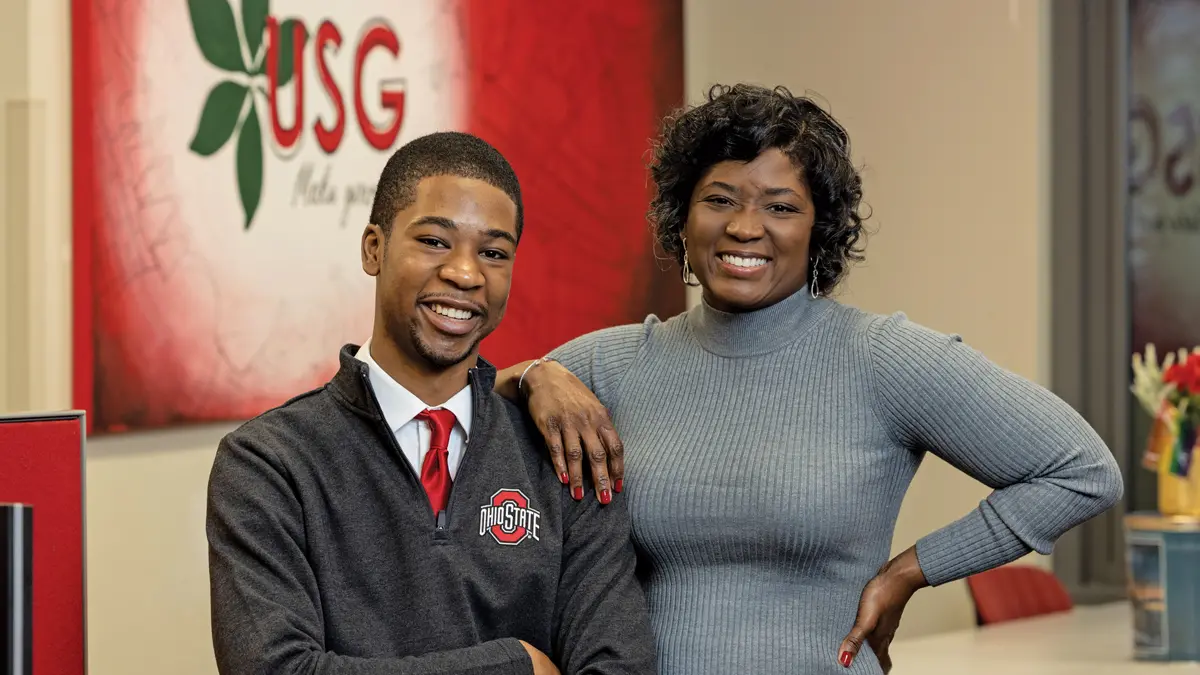
Andrew and Tina Pierce take their roles as servant leaders seriously, and both have given their time and talent to Undergraduate Student Government. In fact, Tina was expecting Andrew when she served in USG in the late ’90s and early aughts. (Photo by Jodi Miller)
Team of dynamos
Mother: Tina is chief of strategy and belonging for The Ohio State University Alumni Association. She also is president of the Undergraduate Student Government Alumni Society, a member of the Columbus Board of Education and a mother of four.
Son: Andrew is a fourth-year student pursuing a bachelor’s and master’s in the John Glenn College of Public Affairs. A Mount Leadership Scholar and former resident assistant, he has served in USG since 2019, including since August as president.
Their work together: Tina and Andrew are co-founders of The WORTH Foundation, a nonprofit aimed at cultivating leadership and increasing civic engagement to reduce poverty and injustice, strengthen democratic values and advance human achievement.
-
What initially attracted each of you to Undergraduate Student Government?
Tina: As a student at Beechcroft High School in Columbus, I was active in clubs and organizations, including student government. When I got to Ohio State, I immediately started to look for opportunities to represent my peers. It was also important to me to remain connected to the larger Columbus community, to bridge that gap between our student population and the world off campus.
Student government sparked my interest initially, and after attending a few meetings I noticed there were not a lot of people who looked like me. This was a great opportunity to represent my community — as a Black student, as a woman, as a first-generation student from an urban background — and be part of making change and ensuring that our voices are equally heard in decision-making.
Andrew: Ohio State has always been in the periphery of my life. My parents met and married here. My grandparents worked here all their lives. So, I was born to be a Buckeye. That said, I didn’t have a good idea about how the machine works.
As a first-year student, I attended a General Assembly meeting for USG and applied for a campus living area senator role. I began learning about leadership and how to connect with my fellow students and understand and address their concerns. So even during my freshman year, I was already learning how to make positive changes on campus.
-
How has your passion for social justice and activism related to your work at USG?
Andrew: In every aspect of my work, I look at ways to make a lasting change. It is important to go beyond performative, surface-level adjustments. I have been so proud of our team this year in how we have worked to respond to critical student needs and maximize the effectiveness of our organizational budget. When I look at the initiatives we have taken on, I recognize that these initiatives can be built on and continued. These efforts have the potential for lasting impact and, in my view, that is the most important part of activism.
Tina: Our passion for social justice is really a generational torch that has been passed down. Both my mother’s parents left impoverished backgrounds, making their way to Columbus in pursuit of a better life — not only for themselves, but also for their families. I was raised to understand that it was my duty to support the growth of the collective, not just myself.
My grandmother and mother instilled in me early on that any idle time I had was not to be wasted, it was to be given to the community. I spent my summers as a child volunteering and giving back to the collective. This is a fire that has been ignited deep in the roots of our family and passed down from generation to generation.
My grandparents were custodians here at the university. They mopped floors and cleaned classrooms, and students and professors would walk by them every day and not know about their brilliance. My grandmother graduated high school with a 4.0 GPA and was bilingual, but because she was a Black woman coming from a large coal mining family, she didn’t have the opportunity to go to college. Yet she worked to make sure that we would have the opportunities that she was denied.
-
In your experience, how have the issues USG works to solve changed from one generation to the next?
Tina: When I became involved in USG, the opportunity was seen more as a resumé builder than anything else, and that was very different from who I was. My primary focus was to establish the diversity senator position, a seat open to any student who demonstrated a commitment to representing diversity on our campus. I worked hard to ensure that position was created and preserved in the infrastructure of USG.
I also chaired the committee to provide allocated funds to other student organizations promoting diversity programming. Although I appreciate that diversity and inclusion efforts are much more mainstream now, they were novel experiences during my tenure with USG.
Andrew: What’s really cool about my involvement with USG is that it has helped me see that many of those initiatives my mom speaks about bringing into existence are still carrying through today, often in different forms. For example, though the diversity senator spot no longer exists, it has been replaced by an executive-level committee committed to promoting diversity and inclusion on our campuses.
In the wake of the 2020 political protests and the paradigm shifts in response to the murder of George Floyd, that committee has now evolved into the justice and equity committee. We now have a robust Black student caucus focusing on the needs of Black students specifically, and we are exploring how to address the needs of our Native American students, our LGBTQ+ students and others.
The allocations provided through my mom’s diversity and inclusion efforts have increased exponentially, to where we are now pledging 25% of our $400,000 annual budget to support them. We are responding to the current issues Ohio State students are facing by maximizing the infrastructure put in place by those who served before us.
-
Tina, how are those strong family values reflected in what you’re doing now with the alumni association?
I’m excited about the opportunity to serve as the alumni association’s first-ever chief of strategy and belonging. My priorities over the next three to five years are to reshape the way we think about who we are engaging and how we are supporting them. Gleaning from best practices and strategies, we can make every individual we engage with feel like a true part of the Buckeye community, allowing them to be seen and heard and valued no matter how they show up.
-
What advice would each of you have for others who might be interested in becoming involved on campus?
Tina: The first step is to get in touch with our alumni association to find information about available opportunities. There are many clubs and societies, and the great thing about Ohio State is, even if you don’t find something that fits what you are looking for, you have the latitude to create a group that aligns with your passions.
Andrew: Don’t be afraid to change things. I think it’s very easy to think, “I’m just a freshman — what can I do to make an impact on this big institution?” The truth is that you can do a lot more than you think.
For me, the true definition of a Buckeye is someone who believes that they can make a change, despite being the smallest or quietest person in the room. Regardless of where you come from, you can make a difference.
